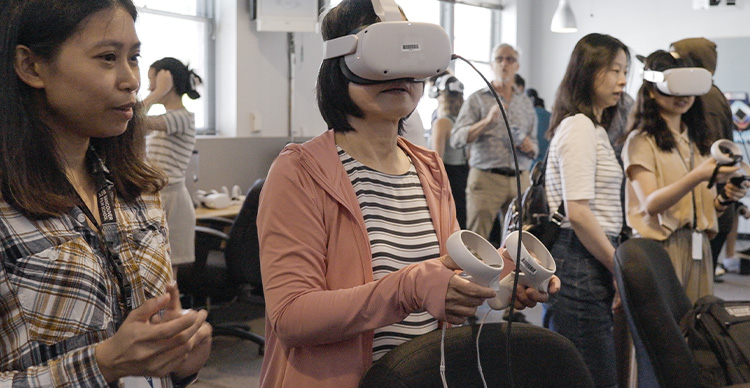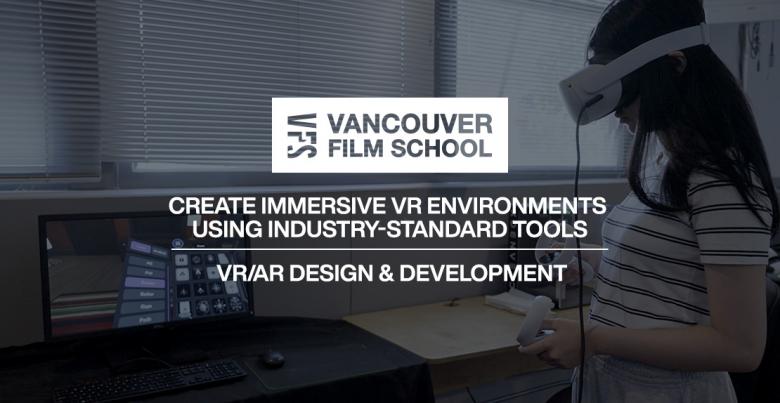Key Takeaways
- Vancouver Film School provides students with access to professional-grade VR development tools through its VR/AR Design & Development program that prepares creators for industry success.
- Understanding fundamental design principles is essential for crafting virtual environments that engage users on psychological and emotional levels.
- Graduates from VFS's VR/AR program develop specialized skills in user experience design that creates more intuitive and engaging virtual worlds for various industries.
Virtual reality has revolutionized the way creators design interactive experiences, and mastering the tools to build immersive VR environments has become essential for modern digital artists and developers. Vancouver Film School offers comprehensive training through our VR/AR Design & Development program that equips students with the skills to create compelling virtual worlds. VFS teaches students to harness industry-standard tools while developing a professional portfolio that showcases their ability to craft engaging VR environments. VFS’s eight-month accelerated program immerses students in cutting-edge technology and connects them with industry partners who provide real-world experience in VR development.
INDUSTRY-STANDARD VR DEVELOPMENT TOOLS TRANSFORM CREATIVE VISIONS
Professional VR development tools form the backbone of creating immersive virtual environments that captivate users and deliver seamless experiences. Developers typically select their development toolkit based on project requirements, with Unity and Unreal Engine emerging as the dominant platforms used by studios worldwide. Beginners often start with user-friendly VR creation platforms that offer intuitive interfaces and template-based systems, while experienced professionals leverage comprehensive production suites that provide granular control over every aspect of the virtual environment.
Vancouver Film School Equips Students with Cutting-Edge VR Toolsets
Vancouver Film School provides students with access to industry-leading VR technology resources including professional-grade headsets, tracking systems, and specialized software. VFS incorporates Unity certification programs within our curriculum to ensure graduates possess verifiable skills that employers recognize and value. Our partnership with Beyond Capture Studio gives students hands-on experience with sophisticated motion capture technology that enhances the realism and interactivity of their virtual environments.
Essential VR Development Tools Used in Professional Environments
- Proficiency in C# or C++ programming for implementing game mechanics
- Unity Engine provides a versatile platform for creating cross-platform VR applications with extensive asset libraries.
- Unreal Engine delivers photorealistic rendering capabilities ideal for immersive environmental design.
- Autodesk Maya offers powerful 3D modeling tools essential for creating detailed virtual objects and spaces.
- Adobe Creative Suite enables texture development and UI design for interactive VR interfaces.
- Substance Designer generates professional materials and textures that enhance environmental realism.
- ZBrush facilitates high-detail sculpting for organic elements within virtual worlds.
- SteamVR and Oculus SDKs provide essential frameworks for hardware integration and optimization.
DESIGN PRINCIPLES CREATE COMPELLING VIRTUAL WORLDS THAT CAPTIVATE USERS
Effective spatial design fundamentals establish the foundation for creating believable virtual environments that users can intuitively navigate and understand. Designers must carefully consider user comfort considerations such as movement flow, scale relationships, and environmental cues to prevent disorientation or motion sickness that can diminish the immersive experience. Cognitive load management becomes crucial in VR design as creators must balance visual complexity with performance requirements while ensuring the environment communicates clearly with users through thoughtful visual hierarchy principles.
Mastering Environmental Storytelling Through Virtual Reality Design
Environmental storytelling techniques allow designers to communicate narrative elements through spatial relationships and contextual details that guide users through immersive experiences. VFS teaches students to implement emotional response triggers through environmental lighting, sound design, and spatial arrangement that create powerful psychological connections to virtual spaces. Students develop comprehensive user journey mapping skills that help them craft cohesive experiences where every element of the virtual environment contributes to the overall narrative and emotional impact.
 VR/AR Design & Development students at VFS learn to create the tools of tomorrow through our cutting-edge, production-focused curriculum.
VR/AR Design & Development students at VFS learn to create the tools of tomorrow through our cutting-edge, production-focused curriculum. VANCOUVER FILM SCHOOL VR/AR PROGRAM BUILDS PROFESSIONAL DEVELOPMENT SKILLS
Vancouver Film School prepares students for diverse VR career paths including environmental artist, interactive designer, VR developer, and experience architect positions across entertainment, healthcare, education, and architectural visualization industries. Our VR/AR curriculum stands apart by combining technical skill development with intensive production-based learning that mirrors real-world development cycles and challenges. Industry partnerships with technology leaders and local studios provide VFS students with networking opportunities, master classes from working professionals, and potential internship placements that facilitate entry into the competitive VR industry.
How Does Project-Based Learning Accelerate Professional Growth?
Students in VFS’s VR/AR program complete progressively complex projects including interactive experiences, educational applications, and entertainment products that demonstrate their evolving technical capabilities. The program incorporates client-based projects with real stakeholders from industry partners who provide authentic requirements, feedback, and expectations that prepare students for professional development environments. VFS implements structured industry mentor feedback sessions where working professionals evaluate student work, suggest improvements, and help students build impressive portfolios that demonstrate job-ready skills.
UNITY AND UNREAL ENGINE POWER PROFESSIONAL VIRTUAL REALITY DEVELOPMENT
Developers must understand the engine performance comparison between Unity and Unreal to select the appropriate framework for their specific VR project requirements and target platforms. Unity offers flexibility and accessibility through its component-based architecture and C# programming, while Unreal provides superior visual fidelity through its powerful rendering capabilities and blueprint visual scripting system. Each engine presents different content creation workflows that impact development efficiency, with Unity favoring rapid iteration and Unreal excelling at achieving photorealistic environments that enhance immersion in virtual worlds.
Students Learn Engine-Specific Optimization Techniques For VR
Effective frame rate optimization remains essential for VR applications as developers must maintain a minimum of 90 frames per second to prevent motion sickness and maintain immersion. Vancouver Film School teaches students sophisticated render pipeline configuration techniques that maximize visual quality while ensuring consistent performance across different VR hardware capabilities. Students master asset optimization techniques including proper level of detail systems implementation that dynamically adjusts model complexity based on viewing distance and importance.
3D MODELING TECHNIQUES ESTABLISH FOUNDATIONS FOR REALISTIC VIRTUAL SPACES
Creating convincing VR environments requires specialized polygon optimization techniques that balance visual detail with performance requirements unique to real-time rendering in immersive spaces. Professional virtual environment modeling approaches emphasize modularity and reusability, allowing developers to construct complex spaces efficiently while maintaining consistent quality and style throughout the experience. Realistic material creation techniques involving physically-based rendering principles ensure that surfaces react naturally to lighting conditions, significantly enhancing the believability of the virtual world while maintaining performance-conscious design principles that support smooth interaction.
Vancouver Film School Animation Programs Support VR Environment Creation
Skills developed in VFS’s 3D Animation program directly transfer to VR environment creation through shared technologies, workflows, and fundamental artistic principles applied to spatial design. Students receive comprehensive training in Maya for VR environments, learning specialized techniques for optimizing assets specifically for real-time rendering and interactive experiences. Our Animation Concept Art program contributes essential visualization skills that help VR creators establish compelling aesthetic directions for their virtual worlds before committing to resource-intensive 3D production pipelines.
Vancouver Film School stands at the forefront of virtual reality education by providing students with industry-standard tools, expert instruction, and professional connections necessary for success in this rapidly evolving field. Our VR/AR Design & Development program combines technical training with creative development, preparing graduates to create innovative immersive experiences across entertainment, education, healthcare, and business applications. Students interested in exploring virtual reality creation can learn more about specialized game and interactive design programs that provide foundational skills for successful careers in immersive technology development.
